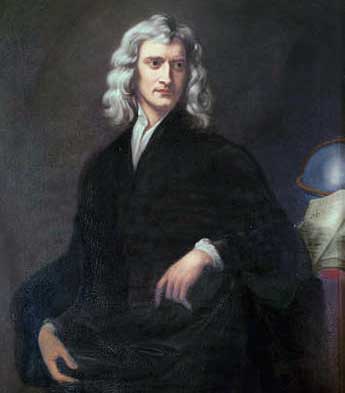
Isaac Newton wrote that he believed God occasionally intervened miraculously to set the planets right in their orbits, i.e., to correct cases of minor perturbations.
Apparently Newton was aware that sometimes two or more planets might be circling the sun and pass relatively near each other, influencing each other gravitationally, pulling each otherʼs 3-D orbits out of whack slightly, and that could add up over time. So Newton pictured God as intervening from time to time to keep his perfect celestial clock running smoothly, correcting such minor perturbations.
Today, astronomers no longer invoke “God” to restore orbital perturbations. Neither do they invoke “God” to explain how all the elements continue to rise out of fusing simple hydrogen atoms (a reaction that occurs inside stars via fusion, with the heaviest elements being created during novas).
In fact, todayʼs astronomers speak in terms of a messy astronomical past filled with orbital perturbations, and also speak in terms of a treacherous future filled with bleak possibilities for our planet and/or solar system:
Articles from New Scientist
“Birth of the planets: The Earth and its fellow planets may be survivors from a time when planets ricocheted around the Sun like ball bearings on a pinball table” 24 August 1991 issue 1783
“Jupiter drifted towards sun in its youth” The giant planet drifted tens of millions of kilometers towards the sun in its youth, a new study suggests, perhaps even helping to form the Earth. 26 September 2004
“Wandering Jupiter took trek towards the sun” 25 September 2004
“Planet formation is violent, slow and messy” A new view of planet formation is revealed by observations of nearby stars - it suggests Earth-like planets might be common. 19 October 2004
“Did a planetary wobble kill the dinosaurs?”… A wobble in Mercuryʼs orbit could have wiped out the dinosaurs…to see when the next potentially catastrophic planetary wobble will be…
“New moons suggest brutal beginnings” Five new moons circling Neptune, and two tiny moons newly discovered around Saturn hint at violent pasts 18 August 2004
Or a nearby star could go nova, or simply pass near our sun. Also, thereʼs the fact that hundreds of asteroids cross the earthʼs orbital path each year.
So we live with far more uncertainty than Newton did. Even our genes apparently have undergone loads of perturbations due to mutation-facilitating ALU sequences, according to this weekʼs news. (“Scientists track ‘stealth’ DNA elements in primate evolution” 02 May 2005)
Not to mention living with the knowledge of other kinds of perturbations, like several major (and many minor) periods of extinction in the past.
Not to mention the fact that a third to a half of all fertilized human eggs simply donʼt survive. Even of those humans who get to emerge living from the womb, half of them used to die by age seven (according to Buffon, writing 200+ years ago).
In nature some species lay several thousand eggs, that vast majority of which donʼt survive. Plant seeds face a similar rate of death. Some bacteria divide so fast that they could fill the oceans and land in a few days, but their death rate is likewise enormous.
My observation is simply that given all we know, above, natural selection is an obvious hypothesis. Each organism is tested by nature beginning with pre- fertilization “sperm wars,” then during the zygote and early embryogenesis stages when a third to a half of them all donʼt survive, and thereʼs the missing twin syndrome later on in pregnancy, a quite common failing, such that perhaps 30% of all single births were once twins in the womb, and then after birth during childhood more testing from mother nature takes place with a large childhood mortality rate (which if you survive that test, your odds of surviving to old age are greatly enhanced), all the way up to adolescence when human beings begin another breeding cycle, and then social and sexual selection plays a further testing role. Such a rigorous testing plan occurs throughout nature for every individual of every species. Thatʼs how natureʼs perturbations are dealt with—not by “god” stepping in miraculously to “correct” things. If that is not “selection” of some sort then what is it?
And if this process selects out the deleterious mutations, then doesnʼt that also mean that it also “selects-in” the beneficial mutations that make a healthy life and sexual reproduction more likely next time? (Just think of it this way—When a Christian sport-person crosses themselves and prays silently that their side “scores a touchdown,” or “makes a basket,” or “gets a hit” and “wins,” then arenʼt they also praying that the other side loses? Such things work both ways.)
Just a thought.


No comments:
Post a Comment